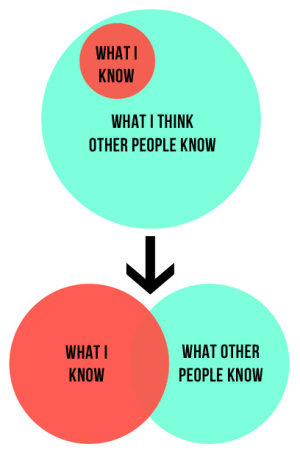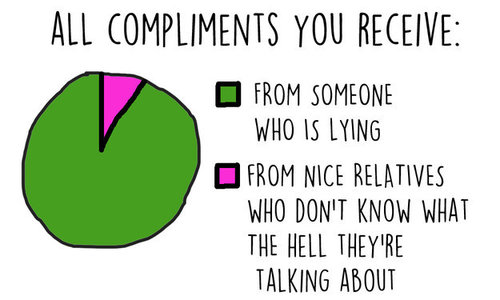Overcoming Impostor Syndrome, aka Shutting Up the Jerk in Your Head
Learn four tools/ideas that will help you overcome impostor syndrome and realize how awesome you really are.

Have you ever felt like you don’t deserve your success? Is it easy to discount your success as luck or good timing? Have you ever felt like you were a fraud, tricking others into thinking you were better than you actually are? You might suffer from impostor syndrome.
Impostor syndrome can be defined (as per the California Institute of Technology Counseling Center) as a collection of feelings of inadequacy that persist even in the face of information that indicates that the opposite is true. It is experienced internally as chronic self-doubt and feelings of intellectual fraudulence. It is really common, with over 70% of people having experienced it at some point in their lives, especially high achievers.
There are all kinds of stats and differing opinions on how it impacts men vs women, but the point is that many people experience this feeling regularly, and it holds them back. Impostor syndrome can make you fear trying new things, avoid being put in situations where you are unsure of how you will perform and make you want to fly under the radar so you cannot publicly fail. All of these mean that you are likely stunting your own potential.

I had seen the term impostor syndrome previously and identified with the description of it strongly. However, it was a few years ago when I saw a presentation by Dr. Valerie Young, a leading expert on impostor syndrome, that it really clicked for me that this was something that I needed to pay closer attention to.
I was sitting in a room with several hundred other women and watched as most of the women in the room nodded their heads as impostor syndrome was described. It was an eye-opening experience as I realized that I was not the only one who carried that feeling around, that the feeling had a name, and I could reflect back more clearly on how it was impacting me. It was the beginning of a conscious battle in overcoming impostor syndrome aka shutting up that jerk in my head that tells me I don’t deserve my success.
Learned Resilience
To be honest, I feel pretty vulnerable sharing that impostor syndrome is something that I still struggle with. It is counter to the perception of what an entrepreneur ‘should’ be and I worry that it hurts my credibility. That said, there are countless other examples of successful people who experience it as well; Emma Watson, Tina Fey, Maya Angelou and Jodie Foster, to name a few. I also know that many of my friends and colleagues experience it regularly and it is part of many of our conversations. It is something that is clearly more common than you would think and worth talking about openly.
I would argue that impostor syndrome is often a motivator for me since it makes me feel like I have to try extra hard to achieve the results I want and feeds my perfectionism. However, it is a problem when it prevents me from trying new things that are outside my comfort zone. That voice in my head can be very loud. Quieting (or at least ignoring) that jerk has become something that I have been working hard on. Like much of the personal growth I have had in the last few years, I was spurred further while supporting my husband through cancer treatment.

Many of my posts bring up this experience but it is hard not to mention something that was truly life-changing. In this case, I was put in a position where I could either step up and take on things that were outside of my comfort zone or let my husband and team down. When pushed out of my head and past my own fear of failing, I was able to do some pretty great things, both as a partner and a business owner. It really became a matter of perspective and scale. If my husband could deal with going through chemo, I was damn well going to deal with everything else and keep the business that we had built together going strong.
That experience is always in the back of my head and reminds me regularly that we are a lot more resilient than we think we are. That I am a lot more resilient than I think I am. The following tools/ideas have helped me in my battle against impostor syndrome, maybe they can help you too.
- Acknowledge
- Don’t compare your insides to someone else’s outsides
- Create a praise folder
- Fake it until you become it
1. Acknowledge
Realizing you have a problem is the first step to overcoming it. I have carried the feelings associated with impostor syndrome for as long as I can remember, but it wasn’t until I gave them a name and started recognizing my triggers that I became better at pushing past it.
Here’s an example:
A few years ago I was asked to be on a recreational volleyball team with my husband and a group of good friends. I REALLY didn’t want to do it but succumbed to the friendly peer pressure and agreed. Rationally, I knew that it was a rec league and even if I was terrible, there were no actual consequences. I was playing with friends who would be supportive, regardless. All that said, this was a situation I would have normally avoided because I didn’t know how I would perform and I didn’t want to be put in a position where I would be ‘discovered’ as an impostor.

I remember sitting in the car on the way to the first game and I was so anxious I had made myself feel sick. I was so worried that I was going to be the worst person on the team and that I would let the team down, but I went ahead and played that game. I pushed through the fear and I wasn’t even too bad. I continued to play almost every Monday for the next two years.
I have come to realize that the feeling of being an impostor might not actually go away but that knowing what the feeling is and how it impacts my decisions is the first step in pushing past it. Looking back, I know there are things that I avoided or didn’t do in fear of being discovered as a fraud, as someone not worthy. I am working hard to not let that happen anymore.
If this sounds at all familiar, think about the feelings that come up when you are pushed outside of your comfort zone, think about the actual consequences of trying something and the reality of the situation. Then see if you to can ignore that jerk in your head and try new things.
2. Don’t compare your insides to someone else’s outsides
I have a sticky note on my monitor with this phrase:
Don’t compare your insides to someone else’s outsides.
I look at it every day and remind myself that most of us only show certain parts of ourselves to the world. We post the most flattering pictures, talk about the most interesting things we do and share our greatest accomplishments. We generally don’t mention the things that make us feel bad about ourselves, or the hard times we are going through, or our mistakes and failures. We only share parts of our whole.
It’s easy to look on social media and feel that you are not going/doing/seeing/being enough. It’s easy to feel like you have to somehow prove to others via social media, or even in conversation, that you are not an impostor. But the truth is we are all putting our best face forward and you have no idea what any given person is actually dealing with. We all have the secret hurts, insecurities, and hardships that we carry, that we know in ourselves. Most of us, at some point, worry about being smart enough, attractive enough, talented enough…just enough.
I know I worry about it all the time, but I remind myself that I am not the only one and we are all just trying to get through life as best we can. So next time you are comparing yourself to someone else and feeling inadequate, remember that you don’t have the whole story, just a few pages.

3. Create a praise folder
This was not my idea, and I can’t actually remember where I saw it, but I read somewhere that one way to help combat impostor syndrome was to collect all of the small pieces of praise you get in a folder (virtual or otherwise).
These might be compliments on a job well done, a thank-you note for helping someone out, a text from a friend saying how wonderful you are, really just whatever makes you feel good. Then, when you were feeling like a fraud or undeserving, you could look back at all the nice things in the folder to help you remember that you are indeed smart, respected, appreciated, and worthy of your success.

I really like this idea because it is easy to focus our attention on our mistakes or failures, which reinforces the impostor feelings of inadequacy and fraudulence. We often ignore or discount the positive feedback we get, which is much harder to do when you have emails, texts, notes, etc. to remind you how awesome you truly are.
Create a folder in your email or on your desktop and every time someone says something nice to you on social media, in an email, or in a text, save it. When you are feeling like an impostor, these things can help bring you back around to the truth.
4. Fake it until you become it
A few years ago I watched a Ted Talk by Amy Cuddy about how your body language shapes who you are. One of the things that she says as part of the talk is
Don’t just fake it until you make it, fake it until you become it.
As someone who is constantly battling impostor syndrome, this idea really resonated with me and, in practice, has actually been a reasonable expectation. Every time I do something that is outside my comfort zone, that I would normally avoid, it gets a little bit easier. Going to events by myself where I don’t know anyone, public speaking, even writing this blog, are all things that I have had to push through my impostor feelings and just do!
What are the things that you avoid because they make you uncomfortable? What are the activities you are afraid to try because you might fail? Consider the real reasons behind your reticence. Like building a muscle, the first few times you work it, it hurts. But it gets a little easier each time until you feel strong.
Summary
Most things in life are easier said than done. Impostor syndrome, aka that loud jerk in your head, is a big challenge and it is hard to change how you feel. The ideas/tools above will probably not make those impostor feelings go away, but they might help you to frame them in a way that lets you overcome them. Maybe not every time, but sometimes. It is an ongoing battle but keep trying. We are all a work in progress so be kind to yourself and know that you are not alone.
Share
Ashley Janssen

Productivity consultant, writer, speaker, serial entrepreneur, chaos calmer, introvert, cat-lady. Lover of books, fitness, old fashioned’s, basketball, and video games.
Follow me on
Twitter
or
LinkedIn.
Hire me for
1 on 1 productivity consulting
or
speaking.
Related articles

What It Really Means To Be Calm

Discovering The Right Way to Live


Comments ()